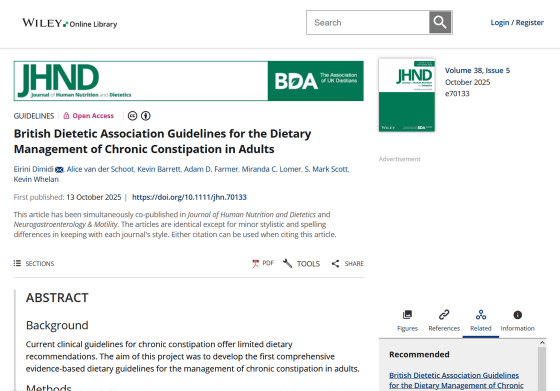British Dietetic Association announces guidelines for people with chronic constipation, including 'eating kiwi fruit' and 'drinking mineral water'

In October 2025, the British Dietetic Association published its 'Dietary Management Guidelines for Adults with Chronic Constipation.' Dr. Vincent Ho, Associate Professor of Gastroenterology at Western Sydney University, explains the contents of the guidelines, which were created based on the results of various clinical trials.
British Dietetic Association Guidelines for the Dietary Management of Chronic Constipation in Adults - Dimidi - 2025 - Journal of Human Nutrition and Dietetics - Wiley Online Library

Eat kiwifruit for constipation, new guidelines say. But ditch the high-fibre diet
https://theconversation.com/eat-kiwifruit-for-constipation-new-guidelines-say-but-ditch-the-high-fiber-diet-267617
Scientists from the British Dietetic Association reviewed 75 clinical trials to develop recommendations for foods, drinks, and supplements to help adults with chronic constipation. Because constipation is perceived differently by different people, the researchers used a definition that covers a wide range of constipation symptoms: 'having only a few solid stools over at least the past three months.'

Mr. Ho is particularly interested in the following points regarding the newly announced guidelines:
You should eat kiwi fruit
To relieve chronic constipation, scientists recommend eating two to three kiwifruits a day for at least four weeks, either the common green or gold variety.
The dietary fiber in kiwifruit
Additionally, kiwifruit contains an enzyme called actinidin, which helps digest protein in the stomach and small intestine, which may help relieve constipation.
Kiwifruit also contains raphido , a needle-shaped calcium oxalate crystal found in the fruit. Raphido promotes mucus production in the intestines, which lubricates stool and promotes bowel movements. Kiwifruit may also reduce the number of methane -producing intestinal bacteria that contribute to constipation .

◆You should drink mineral water
Guidelines also recommend drinking 0.5 to 1.5 liters of mineral water per day for two to six weeks, as it contains
Magnesium oxide supplements have also been shown to soften stool and increase bowel movements, and the scientists recommended taking 0.5 to 1.5 grams of magnesium oxide per day for at least four weeks. People with kidney disease should be careful about magnesium intake and be aware of possible interactions with other medications.
You should eat rye bread
Clinical trials reviewed by scientists have shown that rye bread is more effective at relieving constipation than white bread and common laxatives, and guidelines recommend eating six to eight slices of rye bread for at least three weeks.

High-fiber diets may not be necessary
He said he was surprised that the guidelines did not include a recommendation for a 'high-fiber diet.' While fiber intake is generally considered effective in preventing constipation, clinical trials comparing a high-fiber diet (25-30g per day) with a low-fiber diet (15-20g per day) did not show that a high-fiber diet was effective in relieving constipation.
This does not mean that dietary fiber is ineffective against constipation, and there is strong evidence that dietary fiber is effective for chronic constipation. However, the new guidelines recommend consuming 10g of dietary fiber per day from additives or supplements such as psyllium , rather than a high-fiber diet.
Related Posts:
in Free Member, Science, Food, Posted by log1h_ik







